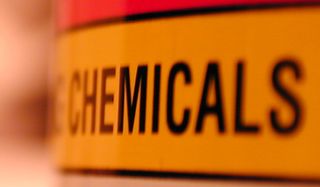
Toxins in the Home: Why Aren't We Doing More? (Op-Ed)

Frances Beinecke is the president of NRDC, served on the National Commission on the BP Deepwater Horizon Oil Spill and Offshore Drilling, and holds a leadership role in several environmental organizations. This article is adapted from a recent post to Switchboard. She contributed this article to LiveScience's Expert Voices: Op-Ed & Insights.
Toxic chemicals touch our lives every day through our furniture, shampoos, food, the air we breathe and in countless other ways. My own family recently had an alarming experience with a synthetic chemical commonly found in paint strippers — methylene chloride.
My daughter and her husband became extremely sick, with effects lasting several weeks. After multiple doctor visits, days lost from work and an exhaustive review of possible contributing factors, my daughter and her husband learned that methylene chloride paint stripper had been used in an apartment below theirs, and the fumes were seeping upwards through vents and fireplaces until it was contaminating their air at measurable levels and making them sick.
About the same time my family was suffering from methylene chloride poisoning, the Environmental Protection Agency (EPA) was asking for public comments on draft risk- assessments for several chemicals, including methylene chloride.
The EPA's risk assessment found that workers chronically exposed to paint strippers are at risk for liver damage and cancer. Fourteen workers have died from acute exposure to methylene chloride paint strippers since 2000. And, consumers who use paint strippers in homes are at risk for problems with the central nervous system. Clearly, my daughter's experience was not unique.
No one should get sick because they work with paint strippers on the job or in the home. Based on the EPA's own risk assessment, it's time for the agency to ban the sale and use of methylene chloride-based paint strippers. That is exactly what NRDC called for in the comments we submitted.
Even if the EPA responds to its own science and bans methylene chloride, a one-at-a-time approach to toxic chemicals is no real solution. There are more than 80,000 synthetic chemicals available for use in commercial and consumer products, manufacturing, schools and the workplace — and for the vast majority, EPA has not required that they be fully tested for their impact on our health.
Sign up for the Live Science daily newsletter now
Get the world’s most fascinating discoveries delivered straight to your inbox.
That's why NRDC is supporting comprehensive reform of chemical oversight, much-needed legislation that would fix our nation's broken approach to toxic substances. Right now, potentially hazardous chemicals are considered innocent until a mountain of data proves them guilty of causing "unreasonable" harm to human health or the environment. And even when we know a substance is deadly — like asbestos — the EPA has been unable to adopt meaningful controls to protect workers and consumers.
Strong reform legislation would require chemical manufacturers to demonstrate their materials are safe for the market, and ensure that EPA can take fast action to protect the public from chemicals — like methylene chloride — that we already know are unsafe.
Consumers want nontoxic products, and entrepreneurial businesses are excited about meeting that demand. The safer products are spurring innovation, decreasing legal liability and increasing shareholder value, along with expanding into new markets and creating new jobs. The American Sustainable Business Council— a national partnership representing over 165,000 businesses and 300,000 entrepreneurs, managers, investors, and others — is supporting comprehensive reform of chemical regulations. So are nurses' organizations, the American Academy of Pediatrics, Vietnam veterans, the American Public Health Association and other health and disease awareness organizations.
Unfortunately, the most recent bill on toxic chemicals misses the mark. Just before he passed away, Senator Frank Lautenberg (D-NJ) worked with Senator David Vitter (R-LA) to introduce a bill that aims to break the longtime stalemate on the issue. They deserve credit for the effort, but in its current form the bill could leave the public with fewer protections than we have now. NRDC is committed to trying to fix the bill so that real reform can move forward.
While my family is thankfully feeling better now that the paint-stripping job is over, millions of Americans are continuing to be exposed to harmful chemicals, often from unavoidable or unknown sources, such as contaminated air, drinking water and consumer products. That's why NRDC is fighting for chemical laws that will keep our families safe.
You can get more information on how to Take Out Toxicsin your own home here.
Beinecke's most recent Op-Ed was Why the Bering Strait Is Under Siege. This article first appeared as My Family's Brush with a Toxic Chemical and Why It's Time to Protect All Families from Known Hazards on the NRDC blog Switchboard. The views expressed are those of the author and do not necessarily reflect the views of the publisher. This article was originally published on LiveScience.com.
Most Popular

